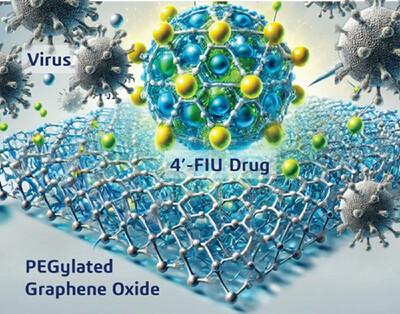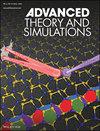聚乙二醇氧化石墨烯用于4 ' -氟吡啶递送:从头开始抗病毒治疗方法
IF 2.9
4区 工程技术
Q1 MULTIDISCIPLINARY SCIENCES
引用次数: 0
摘要
有效的抗病毒药物输送系统,如4 ' -氟吡啶(4 ' -FlU),对于解决COVID-19等病毒感染至关重要。本研究使用从头算分析来检查4 ' -FlU和基于氧化石墨烯(GO)的载体之间的相互作用,无论是否具有聚乙二醇(PEG)功能化,在各种生理条件下。未聚乙二醇化的氧化石墨烯表现出较强的气相结合(−103.36 kcal mol−1),支持系统稳定性,而聚乙二醇化则降低了水相结合(−33.72 kcal mol−1),增强了生物相容性和循环。在酸性和碱性环境中,聚乙二醇化增强了碱性相互作用(- 118.42 kcal mol - 1)。电荷转移动力学受pH和聚乙二醇化的影响,显示出在酸性条件下增强的稳定性,适合肿瘤微环境。氢键稳定氧化石墨烯药物配合物,确保长时间释放。混溶性研究和控释动力学证实,聚乙二醇化氧化石墨烯在酸性环境中表现优异,尤其是在肿瘤递送方面。热力学和量子化学分析强调了环境因素和聚乙二醇化在优化稳定性和反应性方面的作用。GO/PEG-4 ' -FlU是酸性肿瘤中局部药物递送的理想选择,而GO/4 ' -FlU支持需要更广泛分散的全身递送。这项研究为基于纳米技术的抗病毒策略和设计适用于系统和局部应用的适应性药物输送系统奠定了基础。本文章由计算机程序翻译,如有差异,请以英文原文为准。

Pegylated Graphene Oxide For 4′-Fluorouridine Delivery: An Ab Initio Approach to Antiviral Therapy
Effective antiviral drug delivery systems, such as for 4′-Fluorouridine (4′-FlU), are crucial for addressing viral infections like COVID-19. This study used ab-initio analysis to examine interactions between 4′-FlU and graphene oxide (GO)-based carriers, with and without polyethylene glycol (PEG) functionalization, across various physiological conditions. Non-PEGylated GO showed strong gas-phase binding (−103.36 kcal mol−1), supporting systemic stability, while PEGylation reduced aqueous-phase binding (−33.72 kcal mol−1), enhancing biocompatibility and circulation. Adsorption energies were significant in acidic and alkaline environments, with PEGylation intensifying alkaline interactions (−118.42 kcal mol−1). Charge transfer dynamics, influenced by pH and PEGylation, revealed enhanced stability under acidic conditions, suitable for tumor microenvironments. Hydrogen bonding stabilized GO-drug complexes, ensuring prolonged release. PEGylated GO excelled in acidic environments, especially for tumor delivery, as confirmed by miscibility studies and controlled release kinetics. Thermodynamic and quantum chemical analyses highlighted environmental factors and PEGylation in optimizing stability and reactivity. GO/PEG-4′-FlU is ideal for localized drug delivery in acidic tumors, while GO/4′-FlU supports systemic delivery requiring broader dispersion. This research lays the groundwork for nanotechnology-based antiviral strategies and the design of adaptable drug delivery systems for both systemic and localized applications.
求助全文
通过发布文献求助,成功后即可免费获取论文全文。
去求助
来源期刊

Advanced Theory and Simulations
Multidisciplinary-Multidisciplinary
CiteScore
5.50
自引率
3.00%
发文量
221
期刊介绍:
Advanced Theory and Simulations is an interdisciplinary, international, English-language journal that publishes high-quality scientific results focusing on the development and application of theoretical methods, modeling and simulation approaches in all natural science and medicine areas, including:
materials, chemistry, condensed matter physics
engineering, energy
life science, biology, medicine
atmospheric/environmental science, climate science
planetary science, astronomy, cosmology
method development, numerical methods, statistics
 求助内容:
求助内容: 应助结果提醒方式:
应助结果提醒方式:


